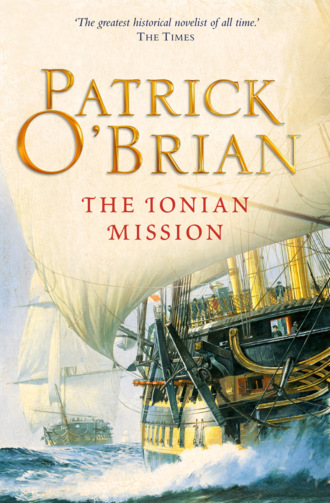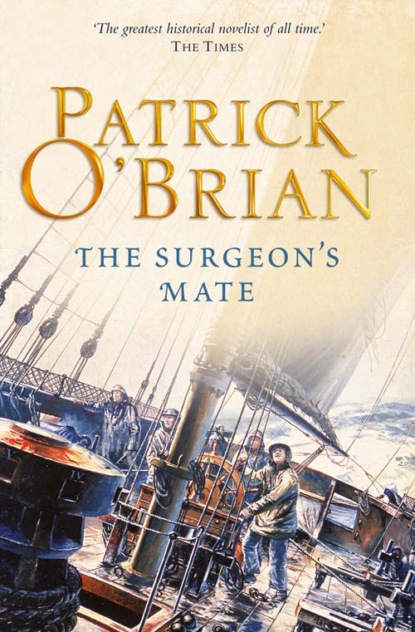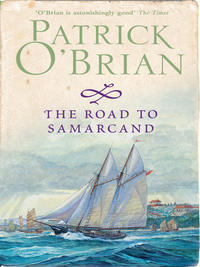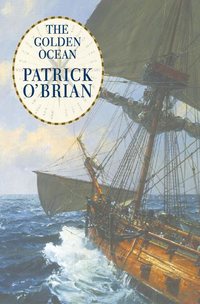
Полная версия
The Ionian Mission
‘But surely Jagiello is a most prodigious whip?’
‘Sure he is Jehu come again: we fairly swept out of London, and he driving in the Lithuanian manner, standing up and leaning out over his team, encouraging them with howls. This was very well for a while, and Diana and I were able to have a word in peace, because he and his cattle spoke the same language; but when we came to change horses the case was altered. Furthermore, Jagiello is not used to driving in England: Lithuania is an aristocratic country where the common people get out of the way, and when the slow wagon from Petersfield declined to pull over he was so displeased that he determined to shave it very close, by way of reproof. But the wagoner fetched the off-hand leader such a puck with his whip that we swerved, took a post and lost a wheel. No great harm, since we did not overturn, and once we had roused out a smith and he had lit his forge all was well in a couple of hours, apart from Jagiello’s arm, which had a sad wrench. I have rarely seen anyone so vexed. He told me privately that he would never have exceeded a hand-canter if he had known he was to drive in a mere howling democracy. That was scarcely just; but then he was horribly cast down, with Diana watching.’
‘Excitable foreigners,’ said Jack. ‘Jagiello is such a fine fellow that sometimes you almost forget it, but at-bottom he is only a foreigner, poor soul. I suppose you took the coach on?’
‘I did not. Diana took it, so she did, the sun being up by then. She is a far better fist with a four-in-hand than I am, the creature.’
He had the creature clear in his glass, and the sun full on her. All the years he had known her she had struggled against unkind circumstances: an expensive, fashionable way of life in her girlhood with no money to support it; then worse poverty still, and dependence; then difficult, troublesome, passionate and even violent lovers; and all this had worn her spirited temper, rendering it mordant and fierce, so that for a great while he had never associated Diana with laughter: beauty, dash, style, even wit, but not laughter. Now it had changed. He had never known her so happy as she had been these last few months, nor so handsome. He was not coxcomb enough to suppose that their marriage had a great deal to do with the matter; it was rather her setting up house at last, with a wide and varied acquaintance around her and the rich easy life she led there – she adored being rich; yet even so a visible, tangible husband was not without an effect, even if he were not of the right race, birth, shape, religion, or tastes – even if he were not what her friends might have wished her at an earlier time. Jack was perfectly silent, wholly concentrated on Sophie far over the water: she was now stooping to the little boy at her side; she held him up high, clear of the rail, and he and his sisters all waved again. He caught the twinkle of their handkerchiefs through the yards of Ajax and Bellerophon, and behind the eyepiece of his telescope he smiled tenderly, an expression rarely seen by his shipmates. ‘Do not suppose,’ said Stephen, continuing his inward discourse, ‘that I am in any way favourable to children’ – as though he had been accused of a crime – ‘There are far too many of them as it is, a monstrous superfluity: and I have no wish, no wish at all, to see myself perpetuated. But in Diana’s case, might it not settle her happiness?’ As though she were conscious of his gaze she too waved to the ship, and turning to Jagiello she pointed over the sea.
The Agamemnon, homeward-bound from the Straits, crossed their field of view, a great cloud of white canvas; and when she had passed Portsmouth was gone, cut off by a headland.
Jack straightened, snapped his telescope to, and looked up at the sails: they were trimmed much as he could wish, which was scarcely surprising since he himself had formed young Mowett’s idea of how a ship should be conducted, and they were urging the Worcester’s one thousand eight hundred and forty-two tons through the water at a sedate five knots, about all that could be expected with such a breeze and tide.
‘That is the last we shall see of the comforts of shore for some considerable time,’ observed Stephen.
‘Not at all. We are only running down to Plymouth to complete,’ said Jack absently, his eyes fixed aloft: the Worcester’s pole-topgallantmasts were too taut, too lofty by far for her slab-sided hull. If he had time in Plymouth he would try to replace them with stumps and separate royal-masts.
He deliberately set his mind to the problem of shipping these hypothetical royals abaft the cap and quite low, to relieve the strain on the notoriously ill-fastened ship in the event of a Mediterranean blow: he knew the wicked force of the mistral in the Gulf of Lions, and the killing short seas it could raise in under an hour, seas quite unlike the long Atlantic waves for which these ships were presumably designed. He did so to deaden the pain of parting, so much stronger than he had expected; but finding the sadness persist he swung himself up on to the hammock-netting and, calling to the bosun, made his way aloft, high aloft, to see what changes would have to be made when his stump topgallantmasts came aboard.
He was still aloft, swinging between sea and sky with the practised, unconscious ease of an orang-utan, close in technical argument with his dogged, obstinate, conservative, greybearded bosun, when a hundred feet and more below him the drum began to beat Roast Beef of Old England for the officers’ dinner.
Stephen walked into the wardroom, a fine long room with a fine long table down the middle, lit by a great stern-window right across its breadth, a room which, despite the lieutenants’ cabins on either side, offered plenty of space for a dozen officers, each with a servant behind his chair, and as many guests as they chose to invite. Yet at the moment it was sparsely inhabited: three Marines in their red coats by the window, the master standing in the middle, his hands on the back of his chair, quite lost in thought, the purser looking at his watch, Pullings and Mowett by the door, drinking grog and evidently waiting for Stephen.
‘Here you are, Doctor,’ cried Pullings, shaking his hand. ‘On time to the second.’ He was smiling all over his tanned friendly face, but there was more than a hint of anxiety in his eye, and in a low voice he went on, ‘Poor Mowett is afraid he upset you, sir, playing off his humours when you came aboard: it was only our fun, you know, sir, but we were afraid you might not have twigged it, being, as I might say, so uncommonly damp.’
‘Never in life, my dear,’ said Stephen. ‘What are you drinking?’
‘Two-water grog.’
‘Then pray give me a glass. William Mowett, your very good health. Tell me, when will the other gentlemen appear? I was deprived of my breakfast, and I raven: have they no sense of time, at all?’
‘There ain’t no other gentlemen,’ said Pullings. ‘We only have a skeleton crew, and so,’ – laughing heartily, since the conceit had only just come to him – ‘we have only a skeleton wardroom, ha, ha. Come, let me introduce the others right away: I have a surprise for you, and I long to show it. I fairly gripe to show you my surprise.’ Mr Adams the purser had seen the Doctor in Halifax, Nova Scotia, at the Commissioner’s ball, and was very happy to see him again; Mr Gill the master, a sad contrast to the purser’s fat round-faced jollity, claimed an acquaintance from the days when he was a master’s mate in the Hannibal, and Stephen had repaired him after the battle of Algeciras – ‘though there were too many of us for you to remember me,’ he said. Captain Harris of the Marines was amazingly glad to be sailing with Dr Maturin: his cousin James Macdonald had often spoken of the Doctor’s skill in taking off his forearm, and there was nothing so comfortable as the thought that if one were blasted to pieces there was a really eminent hand aboard to put one together again. His lieutenants, very young pink men, only bowed, somewhat awed, for Stephen had a great reputation as a raiser of the dead and as the invariable companion of one of the most successful frigate-captains in the service.
Pullings hurried them away to table, took his place at the head, dashed through his soup – the usual wardroom soup, Stephen noticed, quite useful for poultices; though at the same time he did notice a familiar, exquisite, yet unnameable scent on the air – and then called out to the steward, ‘Jakes, is it done?’
‘Done, sir, done to a turn,’ came the distant answer, and a moment later the steward raced in from the galley with a golden pie.
Pullings thrust in his knife, thrust in his spoon, and his anxiety gave way to triumph. ‘There, Doctor,’ he said, passing Stephen his plate. ‘There’s my surprise – there’s your real welcome aboard!’
‘Bless me,’ cried Stephen, staring at his goose and truffle pie – more truffle than goose – ‘Mr Pullings, joy, I am amazed, amazed and delighted.’
‘I hoped you might be,’ said Pullings, and he explained to the others that long ago, when first made lieutenant, he had seen that the Doctor loved trubs, so he had gone out into the forest, the New Forest, where he lived by land, and had dug him a basket, by way of welcome aboard: and Mowett had composed a song.
‘Welcome aboard, welcome aboard,’ sang Mr Mowett
‘Sober as Adam or drunk as a lord
Eat like Lucullus and drink like a king,
Doze in your hammock while sirens do sing,
Welcome, dear Doctor, oh welcome aboard,
Welcome aboard,
Welcome aboard.’
The others ground their glasses on the table, chanting ‘Welcome aboard, welcome aboard,’ and then drank to him in the thin harsh purple liquid that passed for claret in the Worcester’s wardroom.
Thin though it was, the claret was nothing like so disagreeable as the substance called port that ended the meal. This probably had the same basis of vinegar and cochineal, but Ananias, the Gosport wine-merchant, had added molasses, raw spirit, and perhaps a little sugar of lead, a false date and a flaming lie by way of a label.
Stephen and Pullings lingered over the decanter when the others had gone, and Stephen said, ‘I do not like to sound discontented, Tom, but surely this ship is more than usually damp, confined, awkward, comfortless? The mould on the beam that traverses my cabin is two inches thick, and although I am no Goliath my head beats against it. Sure, I have known better accommodations in a frigate; whereas this, if I do not mistake, is a ship of the line, no less.’
‘I do not like to sound discontented neither,’ said Pullings, ‘nor to crab any ship I belong to; but between you and me, Doctor, between you and me, she is more what we call a floating coffin than a ship. And as for the damp, what do you expect? She was built in Sankey’s yard, one of the Forty Thieves: twenty-year-old wood and green stuff with the sap in it all clapped together promiscuous and fastened with copper – precious little copper – and then overmasted to please the landsmen’s fancy, so that when it comes on to blow her timbers all sprawl abroad. She is British-built, sir, and most of what we have sailed in, you and I, have been Spanish or French. They may not be very clever at fighting or sailing ’em, but God love us, they do know how to build.’ He put down his glass and said, ‘I do wish we had a can of Margate beer. But beer ain’t genteel.’
‘It might be more healthy,’ said Stephen. ‘So we are to put in at Plymouth, I hear?’
‘That’s right, sir: to complete. You will have your two mates – and don’t I wish they may like it, when they see the dog-holes where we must stow them – and we must find the best part of our crew, three hundred hands or so. Lord, Doctor, how I hope we can get hold of some right seamen! The Captain can always fill half a frigate with good men come volunteerly, but they won’t amount to much in a ship of the line – no prize-money in a ship of the line on blockade. And of course we are to have three more lieutenants and maybe a chaplain: the Captain is against it, but Admiral Thornton likes to have chaplains aboard and we may have to carry half a dozen out for the fleet. He is rather a blue-light admiral, though a good fighting-man, and he thinks it encourages the hands to have a proper funeral, with the words said by a real parson. Then we must have midshipmen, and this time the Captain swears he will enter none but what are regularly bred to the sea, none but what can hand, reef and steer, work their tides and take double altitudes, and understand the mathematics; he is not going to take a floating nursery, says he. For although you may scarcely believe it, Doctor, a dozen good seamanlike reefers are very useful aboard, learning the raw hands their duty; we are sure to have a good many – raw hands I mean – and they must learn their duty pretty quick, with the French grown so bold and the Americans coming right up into the Channel.’
‘Are not the Frenchmen all shut up in Rochefort and Brest?’
‘Their ships of the line: but when it comes on to blow hard from the east and our squadrons have to run for Torbay, their frigates slip out and chew up our merchantmen something cruel. I dare say we shall have a convoy to see down to the Straits. And then there are the privateers too, very presumptuous reptiles in the Bay. Still, the receiving ships may give us some decent drafts: the Captain has good friends in Plymouth. I hope so indeed, because there is no man in the service to work them up into a smart crew like the Captain, and a smart crew will offset an unweatherly slab-sided old ship. She has the guns, after all, and I can just see him sending her smack into the French line, if only they come out of Toulon, smack into the middle, both broadsides roaring.’ The port, in addition to cochineal, contained a good deal of impure alcohol, and Pullings, a little elevated, cried, ‘Both broadsides into the thick of ’em – breaks the line – takes a first-rate – takes another – he is made a lord, and Tom Pullings a commander at last!’ He turned his glowing, radiant face to the opening door.
‘Well, sir, I am sure you shall be before long,’ said Preserved Killick. He was the Captain’s steward, a coarse, plain, ugly seaman, still quite unpolished in spite of his years of office, but a very old shipmate and therefore entitled to be familiar in an empty wardroom.
‘Preserved Killick,’ said Stephen, shaking his hand, ‘I am happy to see you. Drink this,’ – handing him his glass – ‘it will do you good.’
‘Thankee, sir,’ said Killick, tossing it off without a wink; and in an official voice, though without changing his uncouth, easy posture, he went on, ‘Captain’s compliments and whenever Dr M has the leisure and inclination for a little music, would welcome his company in the cabin. Which he is a-tuning of his old fiddle this minute, sir.’
Конец ознакомительного фрагмента.
Текст предоставлен ООО «ЛитРес».
Прочитайте эту книгу целиком, купив полную легальную версию на ЛитРес.
Безопасно оплатить книгу можно банковской картой Visa, MasterCard, Maestro, со счета мобильного телефона, с платежного терминала, в салоне МТС или Связной, через PayPal, WebMoney, Яндекс.Деньги, QIWI Кошелек, бонусными картами или другим удобным Вам способом.









